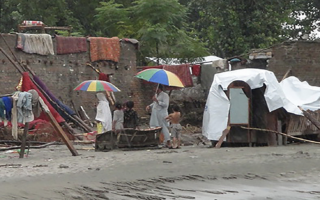
To inform local and global interventions, a number of projects examine the impacts of climate and environmental stressors on a variety of health indicators. The aim is to incorporate climate stressors into prevailing and new models of the social and behavioral determinants of health, identifying the biological and biosocial pathways and mechanisms between exposure to stressors and health outcomes. This work seeks to situate climate stressors as determinants of health, so stakeholders and implementers can understand and act with the best information to effectively address health needs in the context of rapidly changing environments.
Projects across geographies already experiencing profound impacts of a changing climate seek to understand how the environment is directly shaping the health of communities. In Bangladesh, a national-level health surveillance study linking drinking water salinity to eclampsia has suggested a strong association in flood-prone regions of the country. In India, an association emerged between groundwater arsenic and reports of stillbirths and infertility, following a strong spatial pattern. The USAID-funded Breakthrough RESEARCH consortium is evaluating the RISE II Project in Niger, to measure the effectiveness of behavior change programs on health outcomes in a drought-prone region.
Additional projects are interested in how climate change may influence other aspects of health, including sexual and reproductive health and rights, child health and development, and nutrition. We have explored how drought conditions relate to childhood nutrition in India and in Burkina Faso, cognitive development in Kenya, and the health effects of exposure to air pollution.




